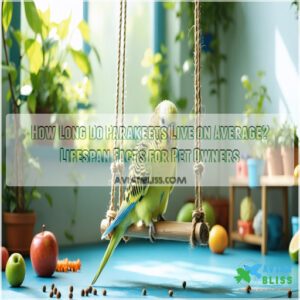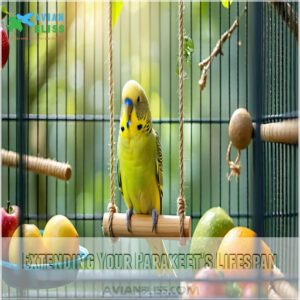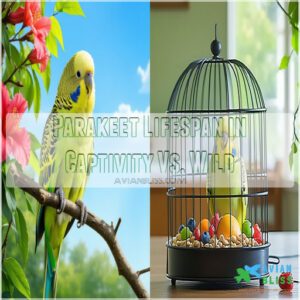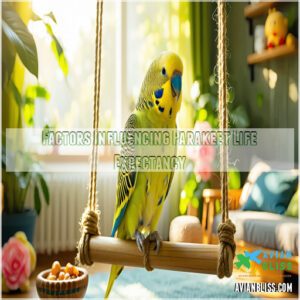This site is supported by our readers. We may earn a commission, at no cost to you, if you purchase through links.

Their lifespan depends on factors like genetics, diet, and overall care. A healthy parakeet thrives on a balanced diet—pellets, fresh fruits, and veggies—and a clean, spacious cage with plenty of mental stimulation.
Regular vet check-ups and observing changes in behavior or droppings can help catch health issues early. In the wild, parakeets may live longer, up to 20 years, thanks to natural diets and freedom, but they face more predators.
Want your parakeet to live its best life? Start with a cozy, clean home!
Table Of Contents
- Key Takeaways
- Parakeet Lifespan
- Factors Affecting Parakeet Lifespan
- Extending Your Parakeet’s Lifespan
- Parakeet Lifespan in Captivity Vs. Wild
- Determining The Age of Your Parakeet
- Factors Influencing Parakeet Life Expectancy
- Oldest Living Parakeet
- Signs of a Healthy Parakeet
- Dealing With a Sick Parakeet
- Lifespan of Birds in General
- Frequently Asked Questions (FAQs)
- How long do indoor parakeets live?
- Do parakeets love their owners?
- How do I know if my parakeet is happy?
- What not to do with a parakeet?
- How long can a parakeet live as a pet?
- Can I leave my parakeets alone for 3 days?
- Do parakeets need a friend?
- What is the lifespan of a female parakeet?
- What is the average lifespan of different species of parakeets?
- How does the lifespan of parakeets in captivity compare to those in the wild?
- Conclusion
Key Takeaways
- Parakeets live 6–12 years on average, but with proper care, they can reach 15 years or more.
- A balanced diet of pellets, fruits, and veggies, along with minimal seeds, is crucial for their health and longevity.
- Regular vet check-ups, a clean cage, and mental stimulation help prevent disease and extend their lifespan.
- Captive parakeets often outlive wild ones due to better care, but they need exercise, a spacious habitat, and a stress-free environment.
Parakeet Lifespan
A healthy parakeet can live 7 to 15 years in captivity, but its lifespan depends on key factors like parakeet genetics, avian care, and pet wellness.
The average parakeet age is around 6 to 12 years, though some birds exceed this with proper care.
Bird longevity improves with a clean environment, regular check-ups, and mental stimulation.
Different breeds vary, with some exceeding 15 years under ideal conditions.
Knowing how long parakeets live helps you prioritize care, from feather health to daily interaction.
Factors Affecting Parakeet Lifespan
Your parakeet’s lifespan depends on several factors, including diet, environment, and genetics. With proper care, you can help them stay healthy and live longer.
Parakeet Health and Disease Prevention
Keeping your parakeet in top health is the key to increasing their lifespan. Parakeets, like all pets, benefit greatly from a solid health routine. Monitoring for illness and preventing diseases ensures their average age stays high.
Proper parakeet care is essential for their well-being.
Here’s how to safeguard your parakeet’s health:
- Schedule annual vet visits to catch early issues.
- Include vaccine options if needed for common parakeet illnesses.
- Watch for changes in weight, behavior, or energy levels.
- Maintain daily cage sanitation to reduce infection risks.
- Observe droppings for any unusual color, shape, or consistency.
- Follow all vet-recommended health supplements for nutrition therapy.
- Maintain good ventilation to avoid respiratory problems.
- Quarantine new birds for 30 days to avoid disease spread.
- Use medical treatments promptly for sickness symptoms.
Parakeet health depends on active care—helping them thrive!
Parakeet Diet
A varied parakeet diet is key to increasing their average lifespan.
While seed options are tempting, they shouldn’t exceed 20% of daily intake—they lack important nutrients.
Focus on pellet foods, which provide a solid nutrient balance and form the foundation of proper parakeet nutrition.
Fresh fruits like apples or leafy greens, and veggies such as carrots, boost vitamin intake and improve overall parakeet life expectancy.
Proper parakeet care and diet are essential for a long lifespan.
Rotate seasonal produce to keep meals interesting and healthy.
Remember to check water daily—fresh, clean water prevents dehydration and keeps them thriving.
Avoid mistakes like overfeeding seeds or skipping vitamin supplements; both can shorten the average lifespan of a parakeet.
Parakeet Habitat Recommendations
A parakeet’s habitat plays a major role in its lifespan.
A cage size of at least 18×18 inches gives your bird the space it needs to thrive.
Finding the right parakeet cage size is essential for their well-being.
Provide bird perches of varied diameters (3/8 to 3/4 inches) to mimic tree branches and protect their feet.
Add nesting boxes for comfort and security, especially during rest.
Rotate toy variety weekly to keep your parakeet mentally stimulated and happy.
Clean food and water dishes daily, with deep cage cleans weekly.
Control the environment by avoiding drafts, extreme temperatures, and loud noises to boost your budgie’s lifespan and life expectancy.
- Habitat tips:
- Roomy cages = happy birds
- Perches mimic nature
- Nesting boxes = calmer birds
- Toy rotation fights boredom
Extending Your Parakeet’s Lifespan
A few simple habits can extend your parakeet’s lifespan far beyond the average.
Care for your bird like a pro with these tips:
- Set up a large cage (18×18 inches or bigger) with toys and perches.
- Prioritize bird nutrition, offering fruits, veggies, pellets, and minimal seeds.
- Ensure regular vet visits to monitor pet wellness.
- Encourage exercise by letting them fly daily.
- Maintain a calm environment, avoiding stress and loud noises.
With these actions, your pet parakeet’s lifespan can flourish!
Parakeet Lifespan in Captivity Vs. Wild
Parakeet lifespan in captivity often differs noticeably from their wild cousins.
In the wild, parakeets like budgies can live 15-20 years, thriving through natural diets, exercise, and diverse genetics.
In captivity, the lifespan of parakeets depends heavily on care.
With proper captive care, parakeet life expectancy in captivity can reach up to 15 years, while poor conditions may shorten it to just 5-7 years.
Here’s a quick comparison:
| Environment | Lifespan | Diet | Key Risks |
|---|---|---|---|
| Wild Survival | 15-20 years | Natural seeds, fruits | Predators, weather |
| Captive Care (Good) | 12-15 years | Balanced diet, produce | Limited exercise |
| Captive Care (Poor) | 5-7 years | Seeds only | Stress, disease |
| Best Setup | 15-20 years | Mixed diet, foraging | Minimal |
Wild parakeets benefit from their natural environment, but proper nutrition, enrichment, and veterinary care allow captive birds to match—or even exceed—wild parakeet longevity.
Determining The Age of Your Parakeet
Determining your bird’s age can feel like solving a riddle, but a closer look at their features and habits can reveal helpful clues.
Physical examination plays a key role in Parakeet Aging. Younger birds, like budgies, often have striped foreheads, while older ones show solid coloring. Feather Analysis is another handy method—juveniles have darker eyes that develop lighter rings as they age.
Behavior Observation adds more hints. Older parakeets tend to be less active, with slower movements, while younger ones brim with energy.
Here’s how to narrow it down:
- Check feathers: Look for forehead stripes or a solid pattern.
- Inspect the eyes: Dark eyes suggest a younger bird; white rings signal adulthood.
- Observe behavior: Energy levels and social habits give age clues.
While not exact, these tips piece together your parakeet’s years.
Factors Influencing Parakeet Life Expectancy
A parakeet’s lifespan depends on factors like diet, environment, and overall care. By understanding these influences, you can help your bird live a longer, healthier life.
Nutrition and Lifespan
A well-balanced diet is essential for your parakeet’s health and longevity.
Beyond the average parakeet lifespan of 5-10, good nutrition can help extend their life expectancy. Focus on high-quality pellets, fresh fruits, and vegetables to meet their nutrient needs.
Avoid an all-seed diet; it’s like giving them junk food every meal. Instead, variety is key to fostering healthy eating habits and supporting parakeet longevity.
Mixing in occasional dietary supplements, as recommended by your vet, provides they get everything they need. Remember, nutrition impacts the budgie lifespan greatly.
By prioritizing food variety and quality, you’re providing your bird with the best chance for a longer, healthier life.
Impact of Environment
Your parakeet’s environment plays a big role in their lifespan in captivity.
Small cages can shorten their budgie life expectancy, so aim for at least 18×18 inches of space.
A balanced parakeet diet is important for their health and longevity.
Keep them comfortable with steady temperatures (65-80°F) and avoid poor air quality from kitchens or smoke.
- Cage Conditions: Roomy and clean space is non-negotiable.
- Air Quality: Fresh, smoke-free air keeps lungs healthy.
- Noise Pollution: Minimize stress by avoiding loud environments.
- Natural Light: Gentle exposure, but no direct sun.
- Climate Change: Stable temperatures prevent illness.
With proper attention to these factors, your parakeet’s life can soar!
Health Indicators and Care
Your pet parakeet’s lifespan depends on their health, so daily care and observation are key.
A healthy parakeet can outlive wild ones, especially when you know what to look for. Think of it like maintaining a car—regular check-ups and good fuel (diet) keep everything running smoothly.
You can find a variety of parakeet health products online.
Here are 8 health indicators to watch for:
- Bright eyes and smooth feathers signal good health.
- Preening shows your parakeet’s keeping up with hygiene.
- Active movement and cage exploration reflect vitality.
- Regular droppings and good digestion are essential.
- Clear breathing without wheezing or tail bobbing is ideal.
- Stable weight and good body condition are essential.
- Social behaviors and chirping show mental wellness.
- Strong perch grip and smooth movements indicate coordination.
Stick to a balanced diet, schedule vet visits, and provide engaging activities. These care strategies can extend the average lifespan of a parakeet.
Oldest Living Parakeet
Ever wondered, what’s the oldest living parakeet? Meet Charlie, the world record holder for parakeet longevity, who lived an incredible 29 years!
This vintage bird’s remarkable lifespan wasn’t just luck—it was a combination of strong genetics and superior care.
A balanced diet is essential for a long lifespan. Her owner prioritized a balanced diet, regular vet visits, and daily mental stimulation.
While most parakeets live 7-15 years, Charlie’s story shows how senior care can help them thrive. With the right support, your feathered friend could also defy the aging process!
Signs of a Healthy Parakeet
Your bird’s health shines through in their daily habits.
Look for these signs of a thriving parakeet:
- Bright eyes, free of discharge, and a curious gaze show alertness.
- Vibrant feathers, smooth and well-groomed, indicate proper care.
- Active behavior, like playing or foraging, reflects energy and happiness.
- A strong beak and regular eating suggest a healthy weight.
By observing these traits, you’ll help extend the average lifespan of a parakeet, ensuring they live a long, happy life.
Dealing With a Sick Parakeet
Spotting signs of illness quickly can save your parakeet’s life.
Look for symptoms like fluffed-up feathers, sitting at the cage bottom, or unusual droppings.
Loss of appetite, strange breathing sounds, or discharge from the eyes or nostrils also signal trouble.
Creating a safe hospital cage is necessary for recovery.
These signs call for immediate vet visits—don’t wait, as delays can shorten the life expectancy for parakeets.
While preparing for the vet, focus on parakeet first aid.
Keep your bird warm and reduce stress by placing the cage in a quiet spot.
If there’s vomiting, temporarily remove food, but always provide fresh water.
Avoid home remedies—they’re no substitute for professional care.
Quick action often leads to parakeet recovery, boosting their lifespan in captivity.
Remember, a healthy budgie’s life depends on your vigilance.
Sick parakeet care directly impacts the pet parakeet lifespan average in captivity.
Lifespan of Birds in General
Understanding bird longevity offers insight into avian aging.
Wild winged creatures, like budgerigars, face predators and harsh conditions, limiting their lifespan to 4–6 years.
In captivity, with proper care, the average lifespan of a parakeet ranges from 7–15 years.
Nutrition plays a huge role—balanced diets of pellets, seeds, fruits, and vegetables support fowl health.
Here’s a quick look:
| Bird Type | Wild Years | Captive Years |
|---|---|---|
| Budgerigar | 4–6 | 7–15 |
| Parrot | 20–30 | 40–60 |
| Cockatiel | 10–15 | 16–25 |
Frequently Asked Questions (FAQs)
How long do indoor parakeets live?
In captivity, parakeets often outlive their wild counterparts, averaging 7-14 years with proper care.
A balanced diet, spacious cage, regular vet visits, and mental stimulation can help your feathered friend thrive for over a decade.
Do parakeets love their owners?
Parakeets can form strong bonds with their owners, especially when you spend time interacting with them daily.
They show affection through chirping, perching on you, or gently nibbling, but trust-building takes patience and consistent care.
How do I know if my parakeet is happy?
A happy parakeet is like a tiny dancer, chirping, playing with toys, and exploring its cage.
It preens often, interacts with you, eats well, and shows curiosity.
Bright eyes and active behavior are key signs.
What not to do with a parakeet?
Don’t neglect your parakeet’s need for social interaction, a clean cage, or a balanced diet.
Avoid placing the cage in drafty spots, feeding only seeds, or ignoring signs of stress or illness.
How long can a parakeet live as a pet?
With proper care, your parakeet can live 10-15 years, sometimes even reaching A balanced diet, regular vet check-ups, exercise, and mental stimulation are key to keeping them healthy and happy.
Can I leave my parakeets alone for 3 days?
Three days alone might feel like an eternity for your parakeets.
Make sure they’ve enough food, water, and entertainment, like toys or a radio.
Ask a friend to check in if possible, to ensure your parakeets have everything they need, and to provide entertainment, in case you are unable to be there.
Do parakeets need a friend?
Parakeets thrive with a companion.
They’re social birds that enjoy interaction, whether it’s with you or another parakeet.
A friend helps reduce loneliness, encourages activity, and promotes mental stimulation for a healthier, happier life, by providing social interaction.
What is the lifespan of a female parakeet?
Female parakeets typically live 5-10 years, though with great care—like a balanced diet, exercise, and regular vet visits—they can reach 15-20 years.
Genetics, stress, and environment also play key roles in lifespan.
What is the average lifespan of different species of parakeets?
Let’s face it, parakeets aren’t immortal, but they’ve got impressive lifespans.
Budgies live 5-10 years, monk parakeets 15-20, and rose-ringed parakeets up to
Species, care, and environment make all the difference.
How does the lifespan of parakeets in captivity compare to those in the wild?
In captivity, parakeets often live longer, averaging 10-15 years with proper care, while wild parakeets typically survive 4-6 years due to predators and environmental challenges.
A safe, enriched habitat makes all the difference.
Conclusion
While parakeets may live 6 to 12 years on average, proper care can extend their lifespan.
A balanced diet, regular vet visits, and a clean, enriching habitat are key.
In captivity, they thrive with attention and stimulation, while wild parakeets face predators but benefit from natural diets.
Understanding how long parakeets live on average helps you provide the best care.
With effort, your feathered friend can enjoy a long, healthy life by your side.
- https://www.petmd.com/bird/how-long-do-parakeets-live
- https://www.kaytee.com/learn-care/pet-birds/how-long-do-parakeets-live
- https://www.reddit.com/r/budgies/comments/r1tn9v/budgie_lifespan/
- https://www.thedodo.com/dodowell/how-long-do-parakeets-live
- https://www.webmd.com/pets/what-to-know-about-parakeets














